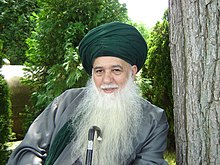Hisham Kabbani
| Hisham Kabbani | |
|---|---|
 |
|
| Born |
January 28, 1945 Beirut, Lebanon |
| Residence | United States |
| Spouse(s) | Hajjah Naziha Adil |
| Website | HishamKabbani.com |
Muhammad Hisham Kabbani (28 January 1945) is a Lebanese-American Sufi Muslim. Kabbani has counseled and advised Muslim leaders to build community resilience against violent extremism. His criticism of extremism has stirred controversy among some American Muslims. In 2012 the Royal Islamic Strategic Studies Centre named him one of the top 500 most influential Muslims. His notable students include Muhammad Ali, Shaykh Nurjan Mirahmadi, former Indonesian President Susilo Bambang Yudhoyono and Hedieh Mirahmadi.
Kabbani was born in Beirut, Lebanon.
On the order of Shaykh Nazim, Kabbani relocated to the United States in 1990 where he has developed over a dozen Sufi centers focused on Islamic spirituality and cultural enrichment.
He is also the founder/chairman of the Islamic Supreme Council of America(ISCA), a non-profit, non-governmental educational organization dedicated to teaching personal moral excellence. ISCA has spearheaded a number of peace initiatives, hosted notable conferences, actively engages in inter-religious dialogue, and promotes traditional and moderate Islamic views.
He is the author of books includingThe Prohibition of Domestic Violence, Sufi Science of Self Realization, Encyclopedia of Islamic Doctrine and Beliefs, and Classical Islam and the Naqshbandi Sufi Order.
Kabbani is also a member of the Elijah Interfaith Institute Board of World Religious Leaders. Shaykh Hisham Kabbani has held meetings with numerous world leaders and has been a key speaker at various conferences, such as the World Economic Forum.
In 2011 Kabbani and Homayra Ziad (Islamic Studies, Trinity College, CT), wrote a fatwa using Quranic exegesis, a review of hadith, and linguistic analysis to determine that the Quran does not condone domestic violence. According to the authors of the fatwa, the broader message of the Qur'an is the promotion of harmony and affection between husband and wife so that they may develop amongst themselves a sacred bond of love and mercy.
...
Wikipedia
